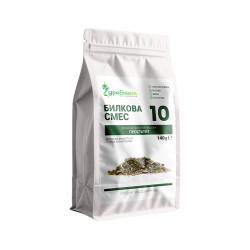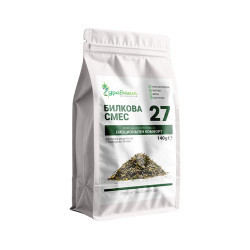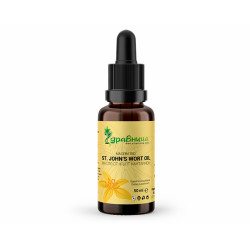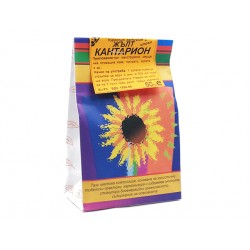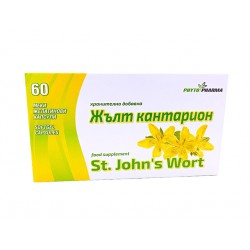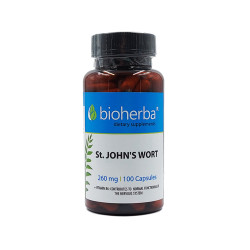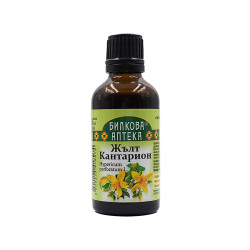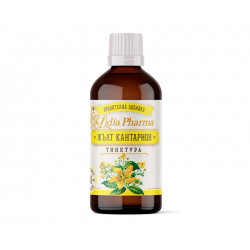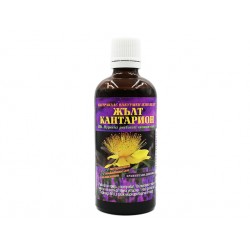St. John's wort (Hypericum Perforatum) is a perennial herbaceous plant, strongly branched, glabrous, 30-100 cm high. The leaves are opposite, without stalks, oval-elliptical, 1-3 cm long. The flowers are yellow, gathered at the top of the stem in an inflorescence - panicle. The stamens are many, fused at the base in 3 bundles. The fruit is a three-nested box. Blooms May - September.
Distribution:
It grows all over Bulgaria in grassy places, in bushes and clearings and in fields. There are about 22 species of St. John's wort in Bulgaria.
Usable parts of the plant:
The aboveground part is collected at the beginning or during flowering by cutting the leafy stems with flowers and buds about 20 cm from the top. Blooming stalks should not be collected.
Healing effect:
Various and very useful properties - anti-inflammatory, antimicrobial, astringent, wound-healing and anti-ulcer action, toning the nervous system, pronounced hemostatic effect, improving the irrigation of the heart muscle, strengthening the heart rate, a slight increase in blood pressure, diuretic effect.
Application:
- inflammatory diseases of the digestive organs;
- indigestion - peptic ulcer of the stomach and duodenum;
- acute and chronic gastritis, enterocolitis, burning, indigestion, diarrhea;
- for burns, contaminated purulent and slowly healing wounds on the skin and mucous membranes;
- in patients with depression, sciatica, neurological disorders, exhaustion after severe illness. The herb improves the general condition of the patient, weight increases, tension, helplessness and fear disappear. The calming effect is enhanced when combined with hops.
Usage:
There are various prescriptions for the preparation of infusions and decoctions of the herb. Internally, it is most often taken as a tea made from a tablespoon of herb per 250 g of water. After boiling for 10-15 minutes, the infusion is filtered and after cooling it is drunk for 1 day.
For the treatment of peptic ulcer disease, herbalists recommend using an infusion of 1 tablespoon of herb per 1 liter of water, which is drunk instead of water for 1 day.
Preparation of oil extract:
100 g of herb, soak in 500 ml of olive oil and put for 10 days. Take 2 teaspoons of the extract in the morning, at noon and in the evening before meals.
Bulgarian folk medicine recommends St. John's wort for gastrointestinal inflammation - gastritis, ulcers, hyperacidity; in mild to moderate symptoms of psychovegetative disorders, anxiety, depressed mood, burning.
Attention!
Do not use in case of hypersensitivity to St. John's wort; pregnancy and lactation; concomitant treatment with other oral medications (for the treatment of HIV infection, for the treatment of migraine, antidepressants, cyclosporine, products that cause hypersensitivity of the skin to light); with increased sensitivity to UV rays (photosensitivity). Do not use for more than 3-6 months without consulting a doctor. Do not take by children under 12 years. Reactions such as gastrointestinal disturbances, fatigue, headache, photosensitivity are possible. If you are taking birth control pills, you should be aware that irregular bleeding may occur.
You should also use additional methods of contraception, as St. John's wort reduces the effectiveness of contraceptives and pregnancy can occur. St. John's wort may reduce the effectiveness of some medicines when taken at the same time.
Pharmacodynamic interactions have also been observed with certain drugs for the treatment of depression, as well as with triptans - for the treatment of migraine. Due to the increased risk of side effects associated with these interactions, the product should not be used concomitantly with these drugs ( effects may be enhanced).




